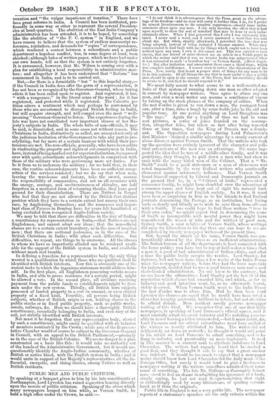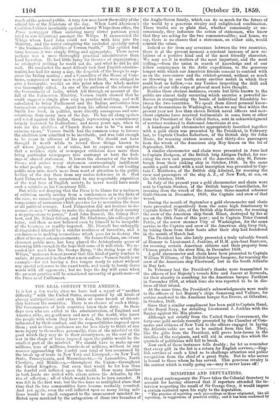PUBLIC MEN AND PUBLIC CRITICISM.
IN speaking at a banquet given to him by his late constituents at Northampton, Lord Lyveden has raised a question bearing directly upon the morale of public criticism. Speaking of the abuse which many newspapers heaped on him while, as Vernon Smith, he held a high office under the Crown, he said :— "I do not think it is advantageous that the Press, great as the advan- tage of its freedom—and no man will carry it further than I do, for I prefer its utmost licentiousness to its complete suppression—should issue indis- criminate abuse upon any man. I can only mention the effect that it had upon myself, to show the sort of mischief that may be done by such indis- criminate abuse. When I first perceived this I own I was extremely irri- tated. I never said a word, and I never answered a word that was said about me. But when, shortly afterwards, I perceived the tone that was being adopted, instead of being irritated I became amused. When they condescended to find fault with me for things which ought not to have been noticed upon any man, I own it did amuse me. This was carried to such excess, that one friend of mine showed me an article in a Welsh paper in which the writer said that it was no wonder India was misgoverned when it was entrusted to such ' a beardless boy' as Vernon Smith. (.3ftteh laugh- ter.) But after irritation and amusement there came a third stage, which was complete indifference. I ceased even to notice the observations of the Press. Now, surely that is not a proper state of things for any man to be in in this country. Of all things the one that is most useful is that a public man should be open to the censure of the Press, that his sensibility should be awake to it, and that he should respond to it."
We must fully assent to what seems to us a well-merited re- buke of that system of running down one man so often adopted in concert by newspaper writers. Once agree to abuse any one man, and even a weak writer can assume a semblance of vigour by taking up the stock phrases of the company of critics. When the mot d'ordre is given to run down a man, the youngest hand can, after a time, raise a laugh by some feeble joke to the old and popular tune. At one period anything on Lord Brougham was " the rage." Again for a length of time we had in verse and pictures, a series of jokes founded on the assump- tion, altogether false, but taken as fact after being repeated three or four times, that the King of Prussia was a drunk- ard. The Opposition newspapers during Lord Palmerston's first Ministry -Stained a similar advantage by a steady current of abuse directed against Vernon Smith. That the writers who took up the question were entirely ignorant of the character and poli- tical antecedents of the man was an advantage. His name sug- gested the idea that he was of a middle-class family, and it was gratifying, they thought, to pull down a man who had risen to rank with the many titled men of the Cabinet. That a " Mr. Smith" could be a good statesman or a man of cleverness was voted impossible by the very Radical writers who continually clamoured against aristocratic influence. B ad Vernon Smith found himself supported by Liberal and Democratic journals on the ground that he, in a " Cabinet of lords," represented a commoner family, lie might have chuckled over the advantage of a common name, and have kept out of sight his natural rank among the upper classes of English society. As it was, it must have been as surprising to him as to his friends to find Radical journals denouncing the Peerage as an institution, but loving lords so dearly and blindly as to wish to save them from alliance with a Smith. If one could hope to find these writers " true to their own order," we might expect that in denouncing the name of Smith as incompatible with mental power they might have remembered the wisest of wits and the wittiest of good men, Sydney Smith, a near relative of Vernon Smith, whose writings did more for Liberalism in his day than one can hope to see ac- complished by twenty newspaper writers of the present time.
But, beyond the attack on his name, Vernon Smith was sys- tematically abused by the Press as an inefficient administrator. The Indian bureau of all the departments is least connected with the home public ; you have but to repeat half-a-dozen times that a man is a good or bad administrator of Indian affairs, and after a time the public lazily accepts the verdict. Lord Stanley, for instance, had not been more than a few weeks at the India House when the newspaper writers, before they had the least materials for judgment, decided that he was a good business man and a cool clear-headed administrator. No one knew to the contrary, but no one knew the affirmative ; Lord Stanley got the benefit of the reputation which chance had awarded him, and which, as far as industry and good intention went, he, as we afterwards learnt, richly deserved. When Vernon Smith went to the India House the mot d'ordre was to abuse him. Had he then been Lord Lyveden the chances are equal that he would have been voted a clever but haughty aristocrat, brilliant in debate, but not attentive to official details. Mere accident mostly governs newspaper writing of this kind. We remember that one of our first daily newspapers, in speaking of Lord Panmure's official career, said it must candidly admit his great industry and his unfailing punctu- ality in never leaving a letter unanswered,—but it must doubt, &c. Lord Panmure and his official subordinates must have smiled at the virtues so readily attributed to him. The writer did not deliberately set down an untruth ; he thought it would add point to his attack on Lord Panmure to admit something, and so he flung in industry and punctuality on mere haphazard. It used in like manner be a current cant to attribute indolence to Lord.
Clarendon. The writers had vaguely heard that he smoked a good deal, and they thought it safe to say that a great smoker was indolent. It would be too much to expect that a newspaper writer should know how Lord Clarendon did the daily work of the Foreign Office, but surely it would tend to give a freshness to newspaper writing if the writers sometimes admitted their igno- rance of something. The late Mr. Hallam—a thoroughly honest man—used. to feel no shame in admitting his ignorance of a book, reach of the general public. A very few men know the reality of the official life of the Ministers of the day. When Lord Aberdeen's Coalition Cabinet inevitably excluded many Whigs from office, the Press newspaper (then enlisting many clever partisan pens) tried to sow discontent amongst the Whigs. It enumerated the Whigs whom Lord John could not take with him into the Ministry, and the writer eulogizing the excluded specially noted " the business-like abilities of Vernon Smith." The epithet had force because it was simply fitting and appropriate. There never perhaps was a more thoroughly practical administrator than Lord Lyveden. He had little fancy for theories of organization ; he attempted nothing he could not do, and what he did he did well. He conducted the most difficult task that English adminis- tration has had for many a day, the despatch of the troops to sup- press the Indian mutiny ; and a Committee of the House of Com- mons, composed of many men ready to find fault, were obliged to give a favourable verdict on this point when the whole matter was thoroughly sifted. As one of the authors of the scheme for the Government of India, which fell through on account of the fall of the Palmerston Ministry, Vernon Smith showed that he could suggest a simple plan easy in practical working, and well calculated to bring Parliament and the Indian authorities into harmonious cooperation. Apart from his official career, Vernon Smith has been, in polities, more directly courageous and con- scientious than many men of the day. He has all along spoken and voted against the Ballot, though representing a constituency largely leavened by Radicalism; and many years ago, when to vote for the abolition of Church Rates was to be "a man of extreme views," Vernon Smith had the common sense to foresee the abolition now admitted to be inevitable, and was bold enough to be years in advance of his party. We should not have thought it worth while to record these things known to all whose judgment is of value, but to express our opinion that a reckless style of newspaper criticism does more than bring particular newspapers into contempt or hurt the feel- ings of abused statesmen. It lowers the character of the whole Press ; and makes many statesmen overweeningly indifferent to what people say. Some of the worst mistakes of our leading public men arise much more from want of attention to the public feeling of the day than from any undue deference to it. Had Lord Palmerston been accustomed to any respectable exposition of the real tone of English society, he never would have made such a mistake as his Conspiracy Bill. But while not denying that the Press is to blame for a rashness of criticism mostly arising from a carelessness as to the facts of the ease, we cannot acquit public men themselves of a reckless in- temperance of accusation which goes too far to neutralize the force of all political censure. Lord Palmerston did not hesitate to de- nounce as men " willing to make the degradation of their country a stepping-stone to power," Lord John Russell, Mr. Sidney Her- bert, rind Mr. Milner Gibson, and Mr. Gladstone, his colleagues of today, and then as now believed even by himself to be incapable of the baseness so readily imputed. Mr. Disraeli has unhappily distinguished himself by a similar readiness of invective, and a carelessness in making accusations which goes far to destroy the effect of his most solemn averments. Sir James Graham, one of our cleverest public men, has long played the Aristophanic game of throwing filth enough in the hope that some of it will stick. We re- corded last week how Mr. George Byng, " the rising hope of the Whigs," makes an honest avowal that this kind of party warfare is unfair. At present it is clear that a man suffers—Vernon Smith is an example—for not having a free tongue ready to retort without any special reference to the exact truth, and ready to bandy fierce words with all opponents ; but we hope the day will come when the present practice will be considered unworthy of gentlemen—of the Press as of Parliament.



























 Previous page
Previous page